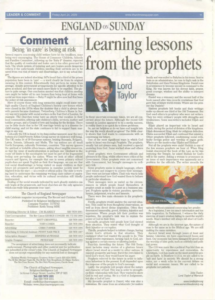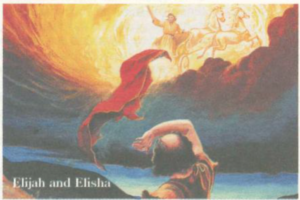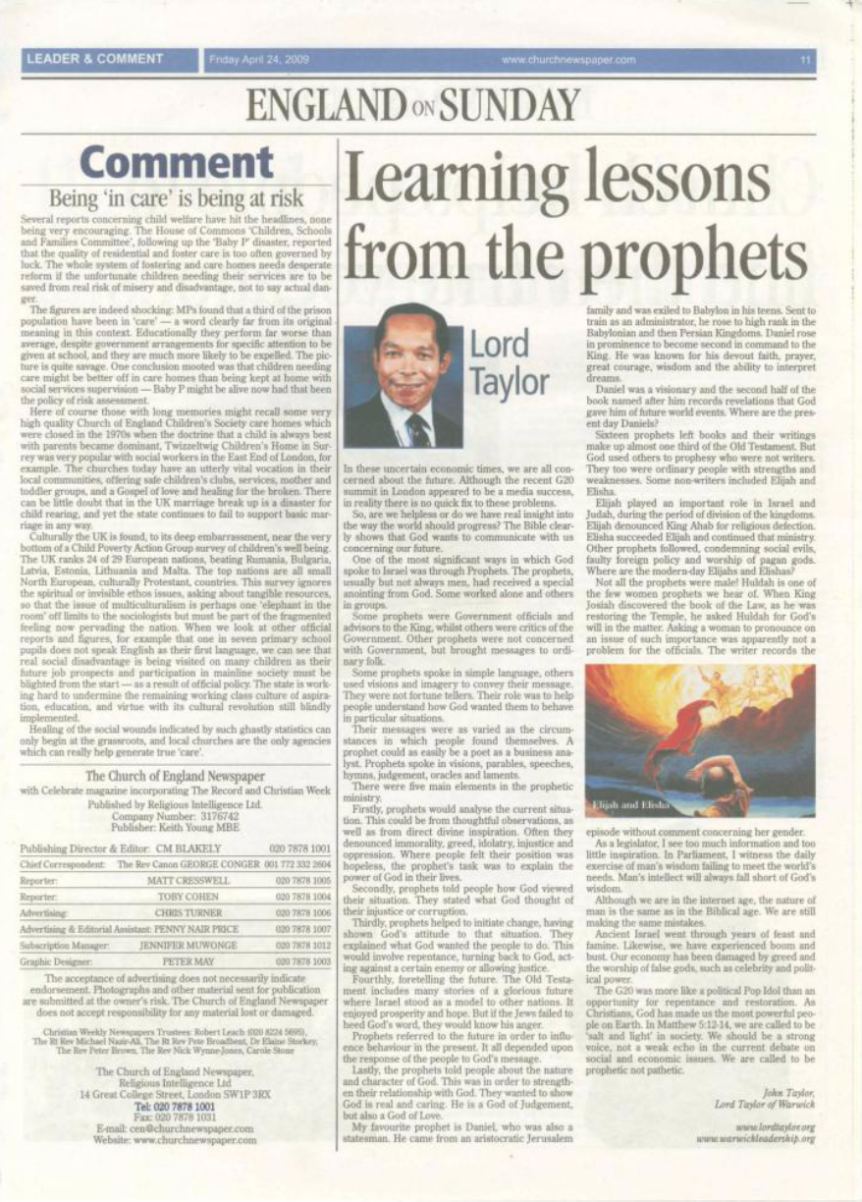Church of England Article By Lord Taylor of Warwick
 In these uncertain economic times, we are all concerned about the future. Although the recent G20 summit in London appeared to be a media success, in reality there is no quick fix to these problems.
In these uncertain economic times, we are all concerned about the future. Although the recent G20 summit in London appeared to be a media success, in reality there is no quick fix to these problems.
So, are we helpless or do we have real insight into the way the world should progress? The Bible clearly shows that God wants to communicate with us concerning our future.
One of the most significant ways in which God spoke to Israel was through Prophets. The prophets, usually but not always men, had received a special anointing from God. Some worked alone and others in groups.
Some prophets were Government officials and advisors to the King, whilst others were critics of the Government. Other prophets were not concerned with Government, but brought messages to ordinary folk.
Some prophets spoke in simple language, others used visions and imagery to convey their message. They were not fortune tellers. Their role was to help people understand how God wanted them to behave in particular situations.
Their messages were as varied as the circumstances in which people found themselves. A prophet could as easily be a poet as a business analyst. Prophets spoke in visions, parables, speeches, hymns, judgement, oracles and laments.
There were five main elements in the prophetic ministry.
Firstly, prophets would analyse the current situation. This could be from thoughtful observations, as well as from direct divine inspiration. Often they denounced immorality, greed, idolatry, injustice and oppression. Where people felt their position was hopeless, the prophet’s task was to explain the power of God in their lives.
Secondly, prophets told people how God viewed their situation. They stated what God thought of their injustice or corruption.
Thirdly, prophets helped to initiate change, having shown God’s attitude to that situation. They explained what God wanted the people to do. This would involve repentance, turning back to God, acting against a certain enemy or allowing justice.
Fourthly, foretelling the future. The Old Testament includes many stories of a glorious fixture where Israel stood as a model to other nations. It enjoyed prosperity and hope. But if the Jews failed to heed God’s word, they would know his anger.
Prophets referred to the future in order to influence behaviour in the present. It all depended upon the response of the people to God’s message.
Lastly, the prophets told people about the nature and character of God. This was in order to strengthen their relationship with God. They wanted to show God is real and caring. He is a God of Judgement, but also a God of Love.
My favourite prophet is Daniel, who was also a statesman. He came from an aristocratic Jerusalem family and was exiled to Babylon in his teens. Sent to train as an administrator, he rose to high rank in the Babylonian and then Persian Kingdoms. Daniel rose in prominence to become second in command to the King. He was known for his devout faith, prayer, great courage, wisdom and the ability to interpret dreams.
Daniel was a visionary and the second half of the book named after him records revelations that God gave him of future world events. Where are the present day Daniels?
Sixteen prophets left books and their writings make up almost one third of the Old Testament. But God used others to prophesy who were not writers. They too were ordinary people with strengths and weaknesses. Some non-writers included Elijah and Elisha.
Elijah played an important role in Israel and Judah, during the period of division of the Kingdoms. Elijah denounced King Ahab for religious defection. Elisha succeeded Elijadl and continued that ministry. Other prophets followed, condemning social evils, faulty foreign policy and worship of pagan gods. Where are the modern-day Elijahs and Elishas?
Not all the prophets were made! Huldah is one of the few women prophets we hear of. When King Josiah discovered the book of the Law, as he was restoring the Temple, he asked Huldah for God’s will in the matter. Asking a woman to pronounce on an issue of such importance was apparently not a problem for the officials. The writer records the episode without comment concerning her gender.
As a legislator, I see too much information and too little inspiration. In Parliament, I witness the daily exercise of man’s wisdom failing to meet the world’s needs. Man’s intellect will always fall short of God’s wisdom.
Although we are in the internet age, the nature of man is the same as in the Biblical age. We are still making the same mistakes.
Ancient Israel went through years of feast arid famine. Likewise, we have experienced boom and bust. Our economy has been damaged by greed and the worship of false gods, such as celebrity and political power.
 The G20 was more like a political Pop Idol than an opportunity for repentance and restoration. As Christians, God has made us the most powerful people on Earth. In Matthew 5:12-14, we are called to be ‘salt and light’ in society. We should be a strong voice, not a weak echo in the current debate on social and economic issues. We are called to be prophetic not pathetic.
The G20 was more like a political Pop Idol than an opportunity for repentance and restoration. As Christians, God has made us the most powerful people on Earth. In Matthew 5:12-14, we are called to be ‘salt and light’ in society. We should be a strong voice, not a weak echo in the current debate on social and economic issues. We are called to be prophetic not pathetic.
